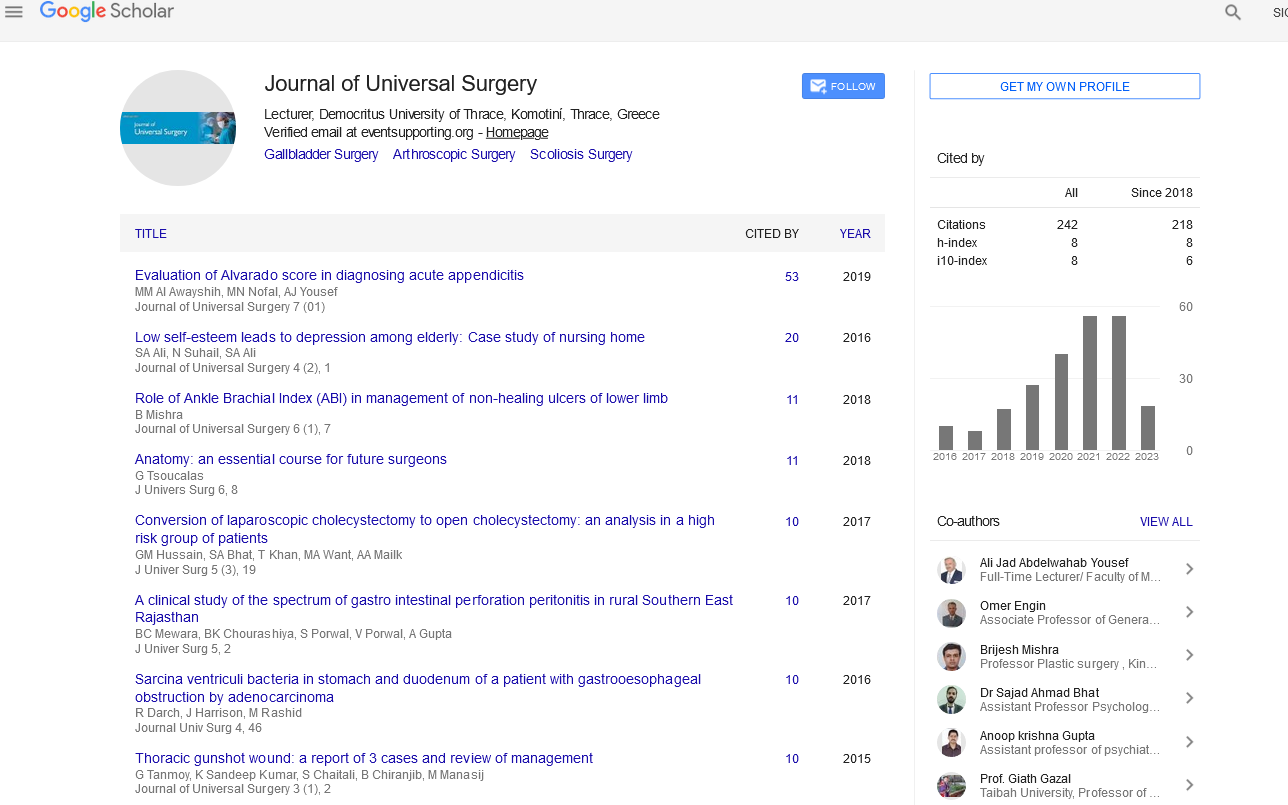Perspective - (2024) Volume 12, Issue 2
Unveiling the Shadows: The Perilous Realities of Surgical Complications
Raulfi Lemin*
Department of General Surgeon, Unversity of Tiradentes, Tiradentes, Brazil
*Correspondence:
Raulfi Lemin, Department of General Surgeon, Unversity of Tiradentes, Tiradentes,
Brazil,
Email:
Received: 28-Mar-2024, Manuscript No. IPJUS-24-14715;
Editor assigned: 01-Apr-2024, Pre QC No. IPJUS-24-14715 (PQ);
Reviewed: 15-Apr-2024, QC No. IPJUS-24-14715;
Revised: 23-Apr-2024, Manuscript No. IPJUS-24-14715 (R);
Published:
30-Apr-2024
Introduction
Surgery stands as one of the most remarkable achievements
in modern medicine, offering hope and healing for countless
individuals worldwide. From routine procedures to complex
interventions, surgical techniques have evolved exponentially,
promising better outcomes and enhanced quality of life.
However, lurking within the realm of surgical interventions are a
host of potential complications, casting shadows upon the
otherwise bright prospects of recovery. This article delves into
the multifaceted landscape of surgical complications, unraveling
the challenges they pose to patients, healthcare providers, and
the healthcare system at large.
Description
The spectrum of surgical complications
Surgical complications encompass a broad spectrum of
adverse events that may arise before, during, or after a surgical
procedure. These complications can manifest in various forms,
ranging from minor inconveniences to life-threatening
emergencies. Some common examples include infections,
bleeding, organ damage, anesthesia-related complications,
thrombosis, and surgical site complications such as wound
dehiscence and hernias.
Challenges faced by patients
For patients, the repercussions of surgical complications can
be profound and far-reaching. Beyond the physical discomfort
and pain, complications may lead to extended hospital stays,
additional surgeries, prolonged recovery periods, and
diminished quality of life. Furthermore, complications can
engender emotional distress, anxiety, and depression, impacting
patients' mental well-being and overall resilience.
Complications may also pose financial burdens, as they often
entail increased healthcare costs, lost wages due to missed
work, and expenses associated with rehabilitation and long-term
care. Moreover, the uncertainty and fear surrounding surgical
complications may erode patients' trust in the healthcare
system, exacerbating feelings of vulnerability and
disillusionment.
Challenges faced by healthcare providers
Healthcare providers grapple with a myriad of challenges in
managing surgical complications, ranging from clinical decisionmaking
to communication with patients and their families.
Successfully navigating these complexities requires a delicate
balance of clinical expertise, empathy, and effective teamwork.
One significant challenge is the prevention and early
detection of complications. Despite advances in surgical
techniques and perioperative care, complications can still occur
unpredictably, posing dilemmas for healthcare providers. Timely
recognition and intervention are crucial in mitigating the impact
of complications and optimizing patient outcomes.
Communication also plays a pivotal role in addressing surgical
complications. Healthcare providers must maintain open,
transparent dialogue with patients and their families, ensuring
they are informed about the potential risks associated with
surgery and any complications that may arise. Clear
communication fosters trust, empowers patients to make
informed decisions, and facilitates shared decision-making in the
face of uncertainty.
Furthermore, healthcare providers must contend with the
emotional toll of surgical complications. Witnessing patients
suffer adverse outcomes can evoke feelings of guilt, frustration,
and helplessness among providers, highlighting the importance
of robust support systems and resources for clinician well-being.
Challenges faced by the healthcare system
Surgical complications pose systemic challenges that extend
beyond individual patients and healthcare providers,
reverberating throughout the healthcare system. The economic
burden of complications is substantial, encompassing direct
medical costs, indirect costs related to lost productivity, and
expenses associated with malpractice litigation.
Moreover, surgical complications contribute to the strain on
healthcare resources, including hospital capacity, surgical
facilities, and skilled personnel. Addressing complications often
requires additional healthcare services, such as diagnostic tests,
consultations with specialists, and rehabilitative care, placing
further demands on an already stretched healthcare
infrastructure.
Preventive strategies and future directions
Despite the inherent risks, strides have been made in
mitigating surgical complications through proactive measures
and quality improvement initiatives. Enhanced preoperative
assessment, optimization of patient comorbidities, adherence to
evidence-based protocols, and stringent infection control
measures are among the strategies aimed at reducing the
incidence of complications.
Moreover, the advent of technology-driven innovations, such
as robotic-assisted surgery, minimally invasive techniques, and
advanced imaging modalities, holds promise for improving
surgical outcomes and minimizing complications. These
advancements enable greater precision, shorter recovery times,
and reduced trauma to surrounding tissues, thereby lowering
the risk of adverse events.
Additionally, emphasis on multidisciplinary collaboration,
standardized protocols, and continuous quality monitoring are
pivotal in fostering a culture of safety and accountability within healthcare institutions. By fostering a proactive approach to
risk management and fostering a culture of safety,
healthcare organizations can strive to minimize the occurrence
of surgical complications and optimize patient care.
Conclusion
Surgical complications represent a complex and multifaceted
challenge in modern healthcare, impacting patients, healthcare
providers, and the healthcare system at large. While the specter
of complications looms large, concerted efforts aimed at
prevention, early detection, and effective management can
mitigate their impact and enhance patient safety. By embracing
innovation, fostering interdisciplinary collaboration, and
prioritizing patient-centered care, we can navigate the shadows
of surgical complications and illuminate a path toward safer,
more resilient surgical practices.
Citation: Lemin R (2024) Unveiling the Shadows: The Perilous Realities of Surgical Complications. J Univ Surg Vol.12 No.2: 013.





